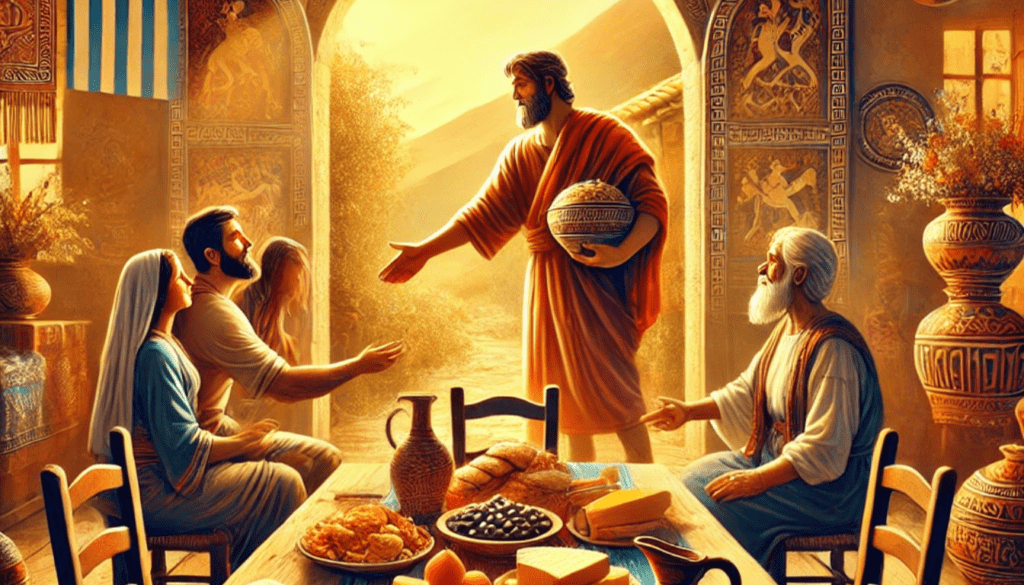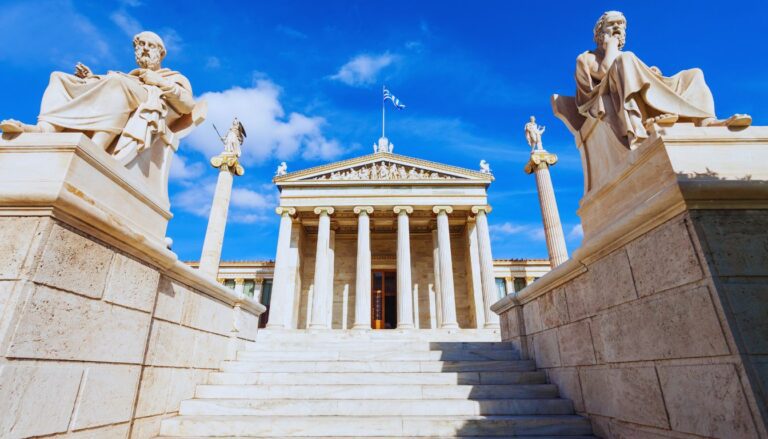Greek hospitality, known as “philoxenia,” is more than just a cultural tradition; it’s a fundamental aspect of Greek identity that has persisted for thousands of years. The word “philoxenia” literally translates to “friend to a stranger,” but its meaning goes far beyond simple friendliness. It embodies a deep-rooted belief in the sanctity of hospitality, a concept so important that it was believed to be protected by Zeus himself, the king of the ancient Greek gods.
In this article, we’ll explore the rich history and enduring legacy of Greek hospitality, from its mythological origins to its modern-day manifestations. We’ll delve into the customs, rituals, and beliefs that have shaped this unique cultural phenomenon, and examine how it continues to influence Greek society and the country’s thriving tourism industry.
Table of Contents
The Origins of Greek Hospitality
The tradition of philoxenia can be traced back to ancient times when Greece was a land of city-states and treacherous journeys. In those days, traveling was a dangerous endeavor. Roads were unsafe, and strangers were often viewed with suspicion. Yet, it was precisely these conditions that gave birth to the concept of philoxenia.
The ancient Greeks believed that any stranger could be a god in disguise, testing the virtue of mortals. This belief, coupled with the practical need for safe havens during travel, led to the development of a complex set of hospitality customs. These customs were not just social niceties, but sacred duties that carried significant religious and moral weight.
The practice of philoxenia served several purposes in ancient Greek society:
- It provided safety and comfort for travelers in a dangerous world.
- It fostered relationships between different cities and regions.
- It allowed for the exchange of news and ideas across vast distances.
- It reinforced the moral and religious values of Greek society.
The concept of philoxenia was not unique to ancient Greece, but it took on a particular significance in Greek culture due to several factors:
- Geography: Greece’s mountainous terrain and numerous islands made travel challenging and often dangerous. Hospitality towards travelers became a necessity for survival and cultural exchange.
- Trade: As a maritime civilization, ancient Greeks relied heavily on trade. Philoxenia facilitated commercial relationships and ensured safe passage for merchants.
- Colonization: As Greek city-states established colonies around the Mediterranean, philoxenia helped maintain connections between mother cities and their colonies.
- Religious Pilgrimages: Many Greeks undertook pilgrimages to religious sites like Delphi or Olympia. The practice of philoxenia ensured that these pilgrims could travel safely.
- Diplomacy: Guest-host relationships often formed the basis of diplomatic ties between city-states, with philoxenia serving as a form of ancient diplomacy.
The development of philoxenia was thus not just a moral or religious imperative, but a practical response to the realities of life in the ancient Mediterranean world.
Philoxenia in Greek Mythology

Greek mythology is replete with tales that underscore the importance of philoxenia. These stories served not only as entertainment but also as moral lessons, teaching Greeks the proper way to treat guests and the consequences of failing in this sacred duty.
One of the most famous examples is the story of Baucis and Philemon. According to the myth, Zeus and Hermes disguised themselves as poor travelers and visited a village, seeking shelter. They were turned away from every home except for the humble cottage of an elderly couple, Baucis and Philemon. Despite their poverty, the couple welcomed the strangers warmly, offering them the best of their meager provisions.
In return for their hospitality, Zeus and Hermes revealed their true identities and granted the couple’s wish to die together when their time came. They also transformed their cottage into a magnificent temple, with Baucis and Philemon serving as its priests for the rest of their lives. Meanwhile, the inhospitable villagers were punished by having their homes destroyed in a flood.
This myth, like many others, reinforces the idea that hospitality is a divine commandment and that those who honor it will be rewarded, while those who neglect it risk divine retribution.
Another notable mythological tale that emphasizes the importance of philoxenia is the story of Admetus and Apollo. According to the myth, Apollo was sentenced to serve as a mortal for a year as punishment for killing the Cyclopes. He came to the palace of King Admetus of Pherae, who treated him with great hospitality, not knowing his divine identity.
Apollo, impressed by Admetus’ generosity, blessed him with several gifts, including helping him win the hand of his bride, Alcestis. Later, when Admetus was fated to die, Apollo intervened again due to the king’s past hospitality, arranging for someone to take his place in the underworld if they volunteered.
This myth underscores several key aspects of philoxenia:
- The importance of treating all guests well, regardless of their apparent status
- The potential for guests to be more than they seem (in this case, a god in disguise)
- The long-lasting benefits that can come from practicing good hospitality
Other mythological figures known for their exemplary hospitality include:
- Nestor, the wise king of Pylos, who always welcomed guests with feasts and gifts
- Alcinous, king of the Phaeacians, who hosted Odysseus and helped him return home
- Eumaeus, the swineherd who showed hospitality to Odysseus when he returned to Ithaca in disguise
These myths served not only as entertaining stories but also as moral guidelines, teaching Greeks the proper way to treat guests and the potential consequences – both positive and negative – of their actions.
The Rituals and Customs of Greek Hospitality
The practice of philoxenia in ancient Greece involved a set of rituals and customs that were carefully observed. These practices were not merely social conventions but were considered sacred duties. The main elements of Greek hospitality included:
- Welcoming the Guest: The host was expected to greet the guest warmly, often with the phrase “Καλώς ορίσατε” (Kalós orísate), meaning “Welcome.”
- Offering Refreshments: The host would immediately offer the guest food and drink, even before asking their name or the purpose of their visit. This was seen as a way to restore the traveler after their journey.
- Providing a Bath: If the journey had been long, the host would offer the guest a bath to refresh themselves. This was often accompanied by the provision of clean clothes.
- Offering a Place to Sleep: The host was expected to provide comfortable sleeping arrangements for the guest.
- Protection: The host was responsible for ensuring the guest’s safety during their stay.
- Gifts: Upon the guest’s departure, it was customary for the host to present them with gifts, known as “xenia.”
- Respect for Privacy: The host was expected to respect the guest’s privacy and not pry into their affairs unless the guest chose to share information.
- The Handshake: Upon meeting, hosts and guests would clasp right hands. This gesture symbolized trust and the formation of a bond between them.
- Libations: Before meals, it was customary to pour a small amount of wine as an offering to the gods, particularly Zeus Xenios.
- Seating Arrangements: The guest would be given a place of honor at the table, often next to the host.
- Entertainment: Hosts would often provide entertainment for their guests, such as music, dance, or storytelling.
- Parting Gifts: The practice of giving gifts to departing guests (xenia) was seen as a way of extending the host’s protection beyond their home.
These customs were reciprocal. A guest who received such treatment was expected to be courteous, not overstay their welcome, and reciprocate if the host ever visited their home.
The order of these rituals was also significant. For example, asking a guest’s name or purpose before offering food and drink was considered rude, as it implied suspicion or unwillingness to help regardless of who they were.
It’s important to note that while these customs were widespread, they could vary between different Greek city-states and over time. For instance, Spartan customs of hospitality were generally more austere than those in Athens or Corinth, reflecting their overall cultural values.
The Role of Zeus Xenios in Greek Hospitality
In ancient Greek religion, Zeus, the king of the gods, had many epithets or titles that described his various roles and attributes. One of these was “Zeus Xenios,” which identified him as the protector of travelers and the enforcer of the laws of hospitality.
The involvement of Zeus in matters of hospitality elevated philoxenia from a mere social custom to a religious obligation. Greeks believed that by honoring guests, they were honoring Zeus himself. Conversely, mistreating a guest was seen as an offense against Zeus, which could incur his wrath.
This divine association had several important implications:
- It provided a powerful incentive for hosts to treat guests well, even if they were strangers.
- It gave travelers a measure of protection, as mistreating them could be seen as sacrilege.
- It reinforced the idea that hospitality was a moral duty, not just a social nicety.
The cult of Zeus Xenios was widespread in ancient Greece, with many cities having temples or altars dedicated to him in this aspect. This religious dimension of philoxenia helped to ensure its observance across the Greek world, transcending local customs and practices.
The worship of Zeus Xenios was integrated into both public and private life in ancient Greece:
- Public Worship: Many Greek cities had temples or altars dedicated to Zeus Xenios. These served as places where travelers could seek protection and where citizens could make offerings to ensure safe travels.
- Household Worship: In private homes, Zeus Xenios was often honored at the household altar. Families would make offerings to him when receiving guests or before embarking on journeys.
- Oaths and Promises: Agreements between guest and host were often sealed with an oath sworn to Zeus Xenios, adding divine weight to the promise.
- Festivals: Some Greek cities held festivals in honor of Zeus Xenios, celebrating the god and the principle of hospitality he represented.
The influence of Zeus Xenios extended beyond Greece proper. As Greek culture spread through trade and colonization, the concept of divine protection for travelers spread as well. This helped to create a network of hospitality customs across the Mediterranean world, facilitating travel and cultural exchange.
It’s worth noting that other gods were also associated with aspects of hospitality. Hestia, goddess of the hearth, was connected with the domestic aspects of hosting, while Hermes, as the god of travelers, was sometimes invoked alongside Zeus Xenios.
Philoxenia in Ancient Greek Literature
The theme of hospitality features prominently in ancient Greek literature, reflecting its central role in Greek culture. Perhaps the most famous exploration of philoxenia in Greek literature is found in Homer’s “Odyssey.”
Throughout his ten-year journey home, Odysseus encounters various hosts, some who honor the laws of hospitality and others who violate them. The contrast between good and bad hosts serves to underscore the importance of philoxenia:
- The Phaeacians, who welcome Odysseus and help him return home, are portrayed as an ideal hospitable society.
- The suitors who have invaded Odysseus’ home, abusing his hospitality in his absence, meet a gruesome fate for their transgressions.
Other literary works also explore the theme of hospitality. For example:
- In Euripides’ play “Alcestis,” the hero Heracles initially abuses the hospitality of his grieving host but later redeems himself by rescuing the host’s wife from death.
- Xenophon’s “Anabasis” provides numerous examples of both positive and negative hospitality encounters during the Greek army’s long march through foreign lands.
These literary works not only reflected Greek values but also helped to reinforce and propagate the ideals of philoxenia throughout Greek society.
The theme of hospitality in Greek literature often served multiple purposes:
- Moral Instruction: Stories of good and bad hosts provided clear examples of proper and improper behavior.
- Plot Device: In epics and dramas, scenes of hospitality often provided opportunities for character development and plot advancement.
- Social Commentary: Depictions of hospitality could be used to comment on social norms and values.
- Cultural Identity: The portrayal of Greek hospitality customs in literature helped to reinforce a sense of shared cultural identity among Greeks.
Some other notable examples of philoxenia in Greek literature include:
- In Aeschylus’ tragedy “The Suppliants,” the concept of hospitality is central to the plot, as the king of Argos must decide whether to grant sanctuary to refugees.
- Plato’s “Symposium” is set at a dinner party, showcasing the intellectual discussions that often accompanied hospitality in ancient Greece.
- In Herodotus’ “Histories,” accounts of hospitality (or lack thereof) often play crucial roles in his descriptions of different cultures and historical events.
These literary depictions not only reflected Greek values but also helped to shape them, creating a feedback loop that reinforced the importance of philoxenia in Greek culture.
The Importance of Guest-Host Relationships in Ancient Greece
The guest-host relationship, known as “xenia” in ancient Greek, was a cornerstone of Greek social and political life. This relationship extended beyond the immediate act of hospitality and could create lasting bonds between individuals, families, and even cities.
Key aspects of xenia included:
- Reciprocity: The relationship was mutual, with roles potentially reversing if the host ever visited the guest’s home.
- Hereditary Nature: Xenia could be passed down through generations, creating long-lasting ties between families.
- Political Alliances: Guest-host relationships between prominent individuals could form the basis for political alliances between city-states.
- Commercial Benefits: Xenia provided a network of contacts that could facilitate trade and commerce across the Greek world.
- Information Exchange: These relationships allowed for the exchange of news and ideas across vast distances.
The importance of xenia in Greek society is evidenced by the fact that violations of these guest-host relationships were often at the heart of major conflicts in Greek history and mythology. The most famous example is the Trojan War, which, according to myth, was sparked by Paris’ violation of xenia when he abducted his host’s wife, Helen.
Philoxenia in Modern Greek Culture
While the religious aspects of philoxenia have largely faded, the core values of Greek hospitality remain deeply ingrained in modern Greek culture. Today, philoxenia manifests in various ways:
- Welcoming Attitude: Greeks are known for their warm and welcoming attitude towards visitors, whether they’re tourists or new residents.
- Generosity with Food and Drink: Offering food and drink to guests remains a central aspect of Greek hospitality. It’s common for hosts to insist that guests eat and drink more, often to the point of excess.
- Filotimo: This uniquely Greek concept, which roughly translates to “love of honor,” is closely related to philoxenia. It encompasses notions of hospitality, generosity, and doing the right thing.
- Community Spirit: In Greek neighborhoods, it’s common for residents to look out for each other and offer help to those in need, extending the spirit of philoxenia to the community level.
- Business Practices: Many Greek businesses, especially in the hospitality industry, strive to embody the principles of philoxenia in their customer service.
Despite the changes brought by modernization, the essence of philoxenia continues to be a source of pride for many Greeks and a defining characteristic of Greek culture.
In modern Greece, philoxenia is often expressed through:
- Open-Door Policy: Many Greeks maintain an “open-door” policy, where friends and family can drop by unannounced and be welcomed.
- Festivals and Celebrations: During local festivals and celebrations, it’s common for Greeks to invite strangers to join in, sharing food, drink, and festivities.
- Assistance to Tourists: Many Greeks go out of their way to assist lost or confused tourists, often inviting them for coffee or offering to show them around.
- Extended Hospitality: It’s not uncommon for Greeks to invite tourists or new acquaintances to family meals or local events, extending hospitality beyond mere politeness.
- Pride in Sharing Culture: Many Greeks take great pride in sharing their culture, history, and traditions with visitors, seeing it as an extension of philoxenia.
The Impact of Philoxenia on Greek Tourism

Greece’s tradition of hospitality has played a significant role in the development of its tourism industry, which is a crucial sector of the country’s economy. The concept of philoxenia has been effectively incorporated into Greece’s tourism brand, attracting visitors with the promise of warm welcomes and genuine hospitality.
Key impacts include:
- Positive Reputation: Greece consistently ranks highly in surveys of tourist satisfaction, often citing the friendliness of locals as a key factor.
- Repeat Visitors: The warm reception many tourists experience often leads to return visits and positive word-of-mouth recommendations.
- Agrotourism: The concept of philoxenia has been instrumental in the growth of agrotourism, where visitors stay with local families in rural areas, experiencing authentic Greek hospitality firsthand.
- Customer Service Standards: The hospitality industry in Greece often trains staff in the principles of philoxenia, setting high standards for customer service.
- Crisis Management: During times of economic hardship, the spirit of philoxenia has helped the tourism industry maintain its appeal, with many visitors reporting feeling especially welcome.
The impact of philoxenia on Greek tourism extends beyond economic benefits:
- Cultural Exchange: The openness and warmth associated with philoxenia encourage meaningful interactions between tourists and locals, promoting cultural understanding.
- Unique Selling Point: In a competitive global tourism market, Greece’s reputation for exceptional hospitality serves as a unique selling point, differentiating it from other destinations.
- Sustainable Tourism: The principles of philoxenia align well with concepts of sustainable tourism, encouraging respectful and mutually beneficial relationships between visitors and host communities.
- Crisis Resilience: During crises (such as economic downturns or natural disasters), the spirit of philoxenia has helped maintain Greece’s appeal as a tourist destination, with many visitors reporting feeling especially welcome and supported.
- Extended Stays: The welcoming atmosphere often encourages tourists to extend their stays or explore less-visited areas of the country, distributing tourism benefits more widely.
Lessons from Greek Hospitality for the Modern World
The ancient Greek concept of philoxenia offers valuable lessons that are still relevant in today’s globalized world:
- Openness to Strangers: In an era of increasing xenophobia, the Greek tradition reminds us of the value of welcoming strangers and the potential for mutual enrichment through such encounters.
- Respect for Guests: The emphasis on treating guests with respect and ensuring their comfort can inform modern customer service practices across various industries.
- Reciprocity in Relationships: The reciprocal nature of xenia offers a model for building lasting relationships, whether in personal or professional contexts.
- Community Building: The practice of extending hospitality to strangers can help build stronger, more cohesive communities.
- Cultural Exchange: Just as xenia facilitated the exchange of ideas in ancient Greece, embracing its principles today can promote greater cultural understanding and dialogue.
- Ethical Treatment of Migrants and Refugees: The principles of philoxenia can inform more humane approaches to dealing with modern-day travelers in desperate circumstances.
As noted by the United Nations World Tourism Organization, cultural heritage and traditions like philoxenia can contribute significantly to sustainable tourism development, benefiting both host communities and visitors.
Additional lessons from philoxenia for the modern world include:
- Business Ethics: The concept of philoxenia, with its emphasis on mutual respect and long-term relationships, can inform ethical business practices in our increasingly interconnected global economy.
- Diplomatic Relations: The role of hospitality in ancient Greek diplomacy offers insights for modern international relations, highlighting the importance of personal connections and cultural understanding.
- Social Responsibility: The idea that hosts have a responsibility to care for their guests can be extended to corporate social responsibility, encouraging businesses to care for their communities and environments.
- Digital Hospitality: In our increasingly digital world, the principles of philoxenia can guide the development of more welcoming and respectful online communities and digital services.
Challenges to Philoxenia in Contemporary Greece
While the spirit of philoxenia remains strong in Greece, several modern challenges have put pressure on this ancient tradition:
- Mass Tourism: The sheer volume of tourists in popular destinations can sometimes lead to ‘hospitality fatigue’ among locals.
- Economic Pressures: Economic crises have made it more difficult for some Greeks to maintain the generous standards of traditional hospitality.
- Commercialization: There’s a risk of philoxenia being reduced to a marketing tool, potentially losing its genuine spirit.
- Cultural Misunderstandings: Tourists unfamiliar with Greek customs may misinterpret or fail to reciprocate hospitality appropriately.
- Migration Issues: The influx of refugees and migrants has tested Greece’s capacity for hospitality on a national scale.
- Modernization: Changing lifestyles and values, particularly in urban areas, can sometimes conflict with traditional hospitality practices.
Despite these challenges, many Greeks continue to uphold the values of philoxenia, adapting the tradition to modern circumstances while maintaining its core principles.
Other challenges include:
- Overtourism: In some popular destinations, the sheer number of visitors can strain local resources and test the limits of hospitality.
- Digital Disconnection: The rise of digital tourism (online bookings, review sites, etc.) can sometimes create a barrier to the personal connections that are at the heart of philoxenia.
- Generational Shifts: Younger generations, influenced by global trends, may sometimes prioritize privacy and individuality over traditional communal values.
- Security Concerns: In an age of global terrorism and increased security measures, the openness associated with philoxenia can sometimes conflict with safety protocols.
Conclusion: The Enduring Legacy of Greek Hospitality
The tradition of philoxenia, deeply rooted in ancient Greek culture, continues to shape Greek society and its interactions with the world. From its mythological origins to its modern manifestations in the tourism industry, Greek hospitality has demonstrated a remarkable resilience and adaptability.
The core values of philoxenia – generosity, respect for strangers, and the sanctity of the guest-host relationship – offer valuable lessons for our increasingly interconnected yet often divided world. They remind us of the potential for human connection and mutual understanding that can arise from the simple act of welcoming a stranger.
As Greece navigates the challenges of the 21st century, from economic pressures to the complexities of mass tourism and migration, the spirit of philoxenia provides a moral compass and a source of national pride. It serves as a bridge between the country’s rich cultural heritage and its modern identity.
Ultimately, the enduring legacy of Greek hospitality is not just its impact on Greece’s culture and economy, but its universal message: that openness, generosity, and respect for others are fundamental to building a more harmonious and interconnected global community.
In embracing the principles of philoxenia, we not only honor an ancient tradition but also take a step towards a more welcoming and understanding world.
As we reflect on the ancient tradition of philoxenia and its modern manifestations, we can see how this concept has evolved while maintaining its core values. In today’s globalized world, where cross-cultural interactions are commonplace, the principles of Greek hospitality offer valuable insights:
- Building Trust: Just as philoxenia helped build trust between strangers in ancient times, its principles can guide us in fostering trust in our diverse, multicultural societies.
- Ethical Tourism: The concept of philoxenia can inform more sustainable and respectful approaches to tourism, emphasizing mutual respect between visitors and host communities.
- Business Ethics: The reciprocal nature of xenia provides a model for ethical business relationships, emphasizing long-term mutual benefit over short-term gain.
- Diplomacy: The role of hospitality in ancient Greek diplomacy reminds us of the power of personal relationships and cultural exchange in international relations.
- Community Resilience: The communal aspects of philoxenia, where the entire community takes responsibility for welcoming strangers, offer a model for building more resilient and inclusive societies.
As we face global challenges such as climate change, migration crises, and cultural conflicts, the ancient Greek tradition of philoxenia reminds us of our shared humanity and the transformative power of hospitality. It challenges us to extend welcome and respect to strangers, to be open to new ideas and experiences, and to recognize the divine or the extraordinary in every person we encounter.
In embracing philoxenia, we not only connect with an ancient and noble tradition but also take a step towards building a more open, compassionate, and interconnected world. The legacy of Greek hospitality, therefore, is not just a relic of the past, but a living tradition that continues to offer guidance and inspiration for navigating the complexities of our modern world.













